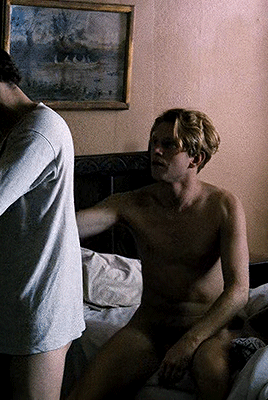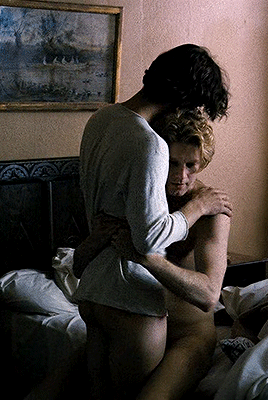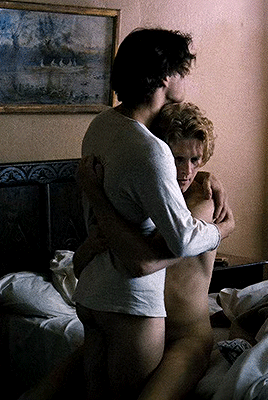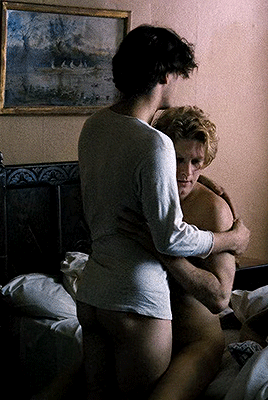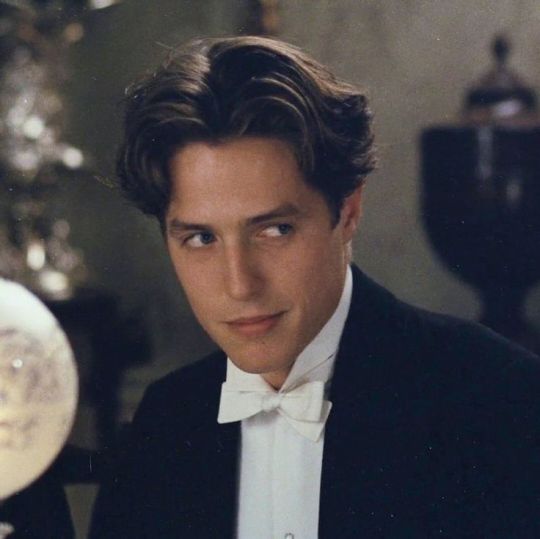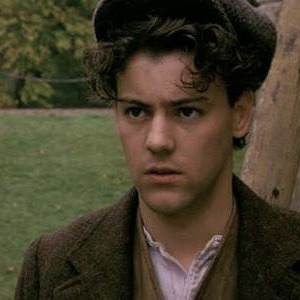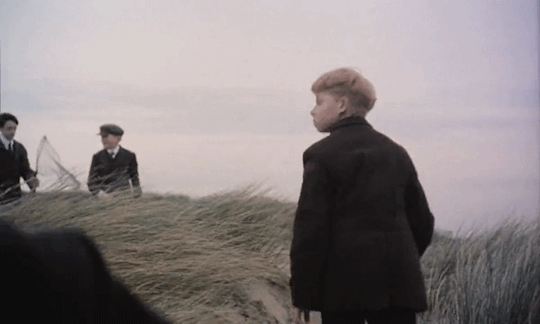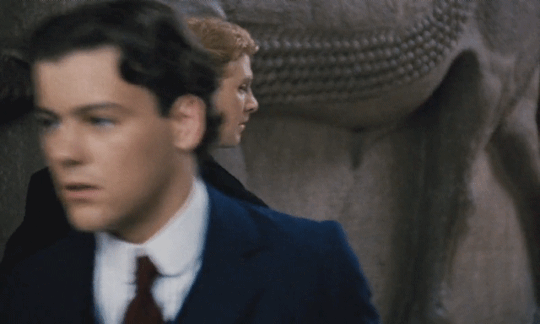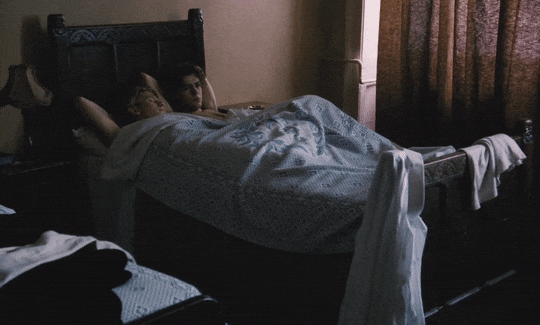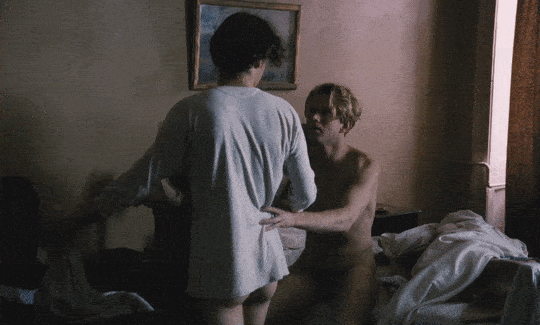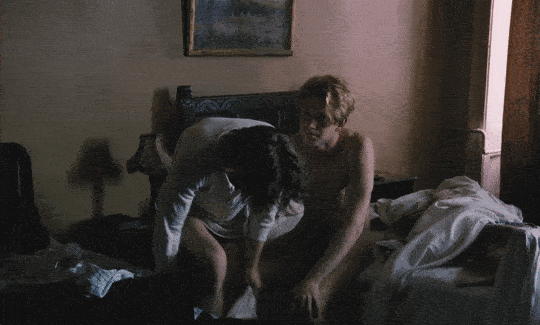Text
In E.M. Forster's Maurice, Where Did the Idea for the Cricket Scene Come From?
Having visited Edward Carpenter's house, where E.M. Forster initially conceived the idea for Maurice during his visit in 1913, I find it interesting that the Carpenter estate is located right next to a cricket club called "Holmesfield Cricket Club," established in 1905.
For those familiar with Maurice, cricket likely carries some significance—in the novel, it is through cricket that Maurice and Alec first experience their "us against the world" moment:
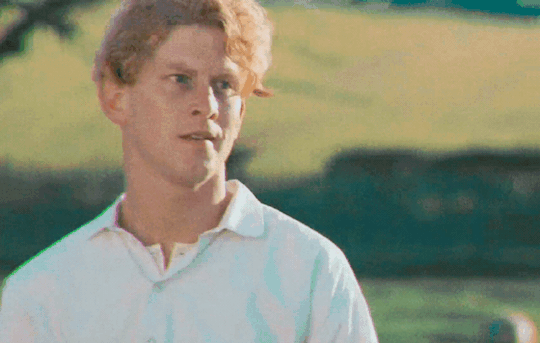
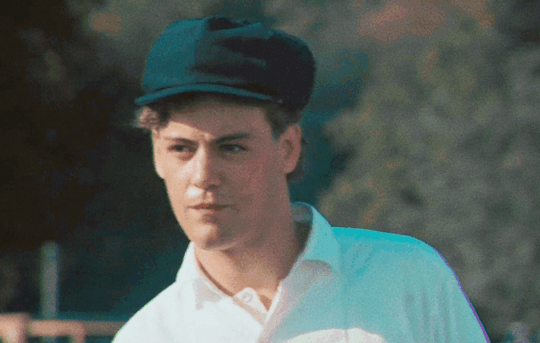
"Maurice played up too... and he felt that they were against the whole world, that not only Mr Borenius and the field but the audience in the shed and all England were closing round the wickets. They played for the sake of each other and their fragile relationship If one fell the other would follow. They intended no harm to the world, but so long as it attacked they must punish, they must stand wary, then hit with full strength, they must show that when two are gathered together majorities shall not triumph." - Maurice, E.M. Forster
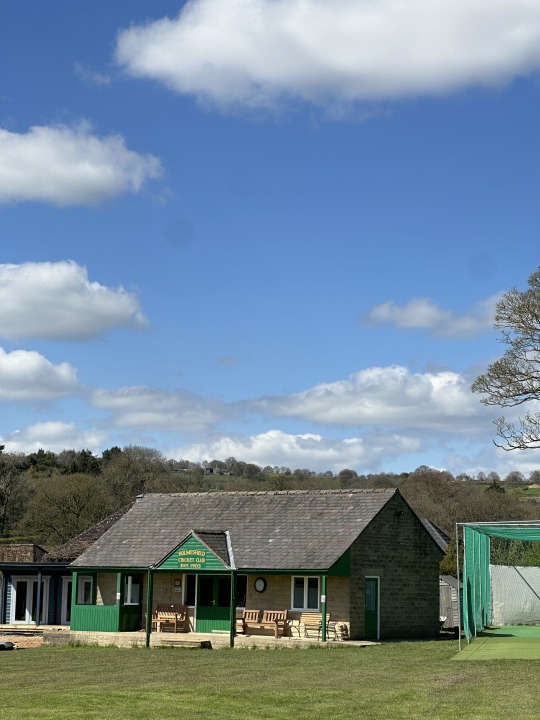
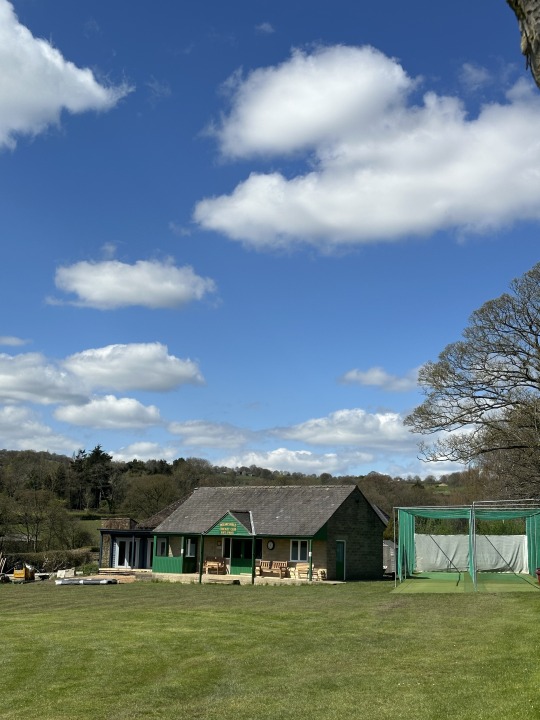
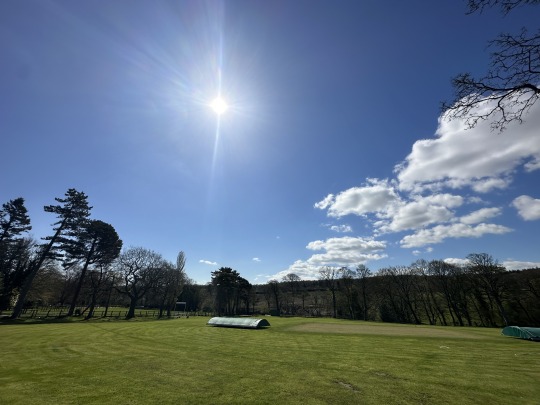

This "us against the world" mentality is exactly what Edward Carpenter and George Merrill (the real-life models for Maurice and Alec) had lived by. The couple resided in this remote, secluded place, surrounded by forests and woods, outside society, like two brave outcasts, mirroring how Maurice and Alec live in their own fictional "greenwood'.
The cricket scene in the novel is obviously a foreshadow to that life as outcasts away from society, but I'd never really thought about why Forster chose cricket as a medium for Maurice and Alec to have their first pivotal "us against the world" moment. I simply assumed that cricket, being a popular sport, was an easy and natural plot device for Forster.
Then, I visited the Carpenter house, and saw the Holmesfield Cricket Club right next to it, and couldn't help but deduce that Forster, who had previously visited the house on a few occasions before 1913 and was inspired by Carpenter and Merrill during his 1913 visit to write Maurice, likely also noticed the cricket club. This observation might have sparked the idea of incorporating a cricket match into the story, thus establishing a direct connection between Maurice and Alec's "us against the world" moment and the Carpenter house—the very physical birthplace of the novel where the real-life models of Maurice and Alec lived.


This is just my theory. In fact, there isn't any mention of the Holmesfield Cricket Club in Forster's diaries and drafts related to Maurice. However, one thing I learned from reading Maurice is that there is no coincidence in the novel, so it's my personal belief that this connection between the fictional plot and the reality of the Carpenter house is also no coincidence—all the more reason why Forster was a freaking genius.
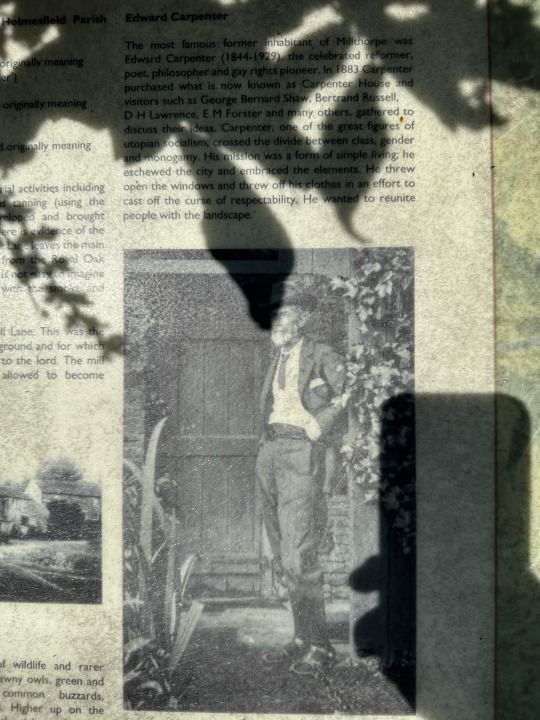
102 notes
·
View notes
Text
…Came across a stray Youtube comment that claims that Alec is Irish, but I don’t remember a single hint at this from the book - is there anything, any additional material that says so, or did the commenter just get too happy with their headcanon? Or is it just my own reading comprehension failing me?
…Anyway, whichever the case, hell, headcanon accepted. :,D
49 notes
·
View notes
Text
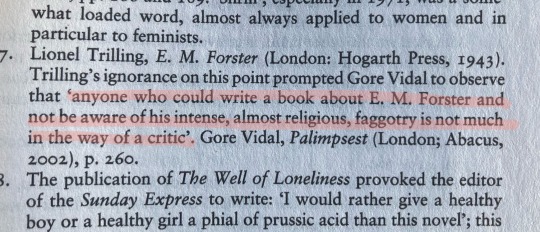
Raise your hand if you too possess an intense, almost religious faggotry
7K notes
·
View notes
Text
When you get so irked by someone saying that "Clive and Maurice were the better romantic pairing because they truly loved each other while Alec and Maurice's relationship was based on nothing but sex" that you end up writing a small essay in a Pinterest comment section (which had to be broken up into 500 word chunks because of Pinterest's word limit).
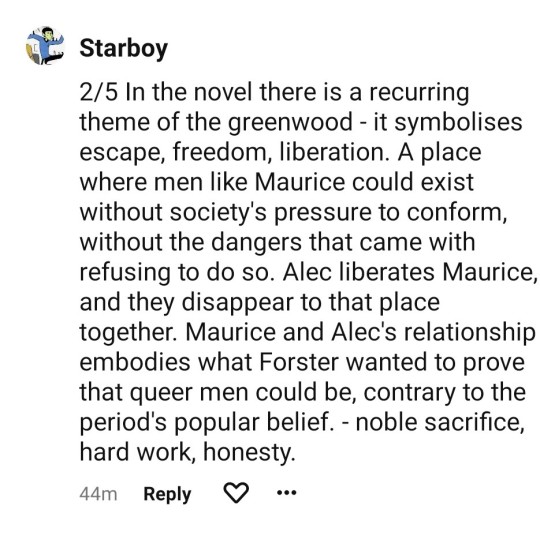
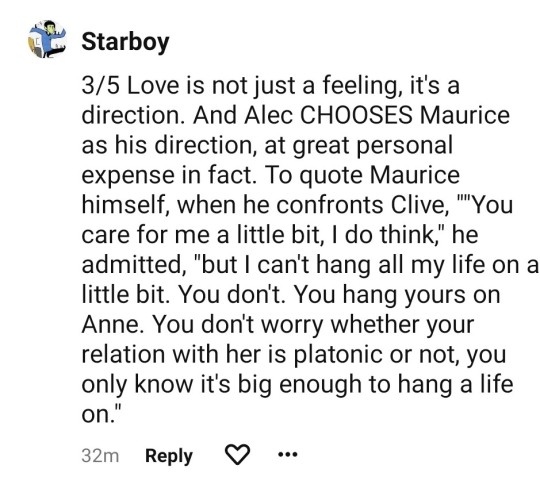
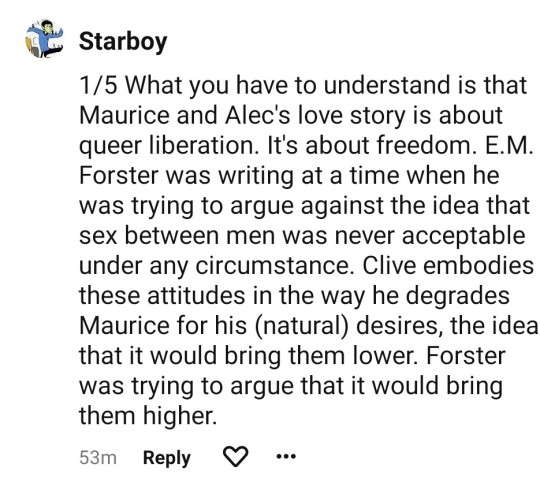
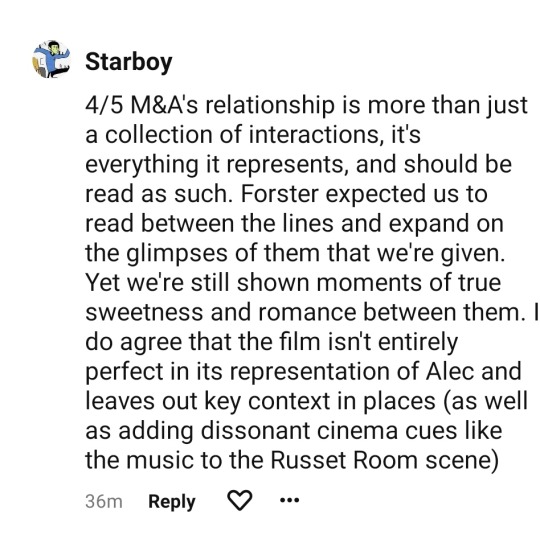
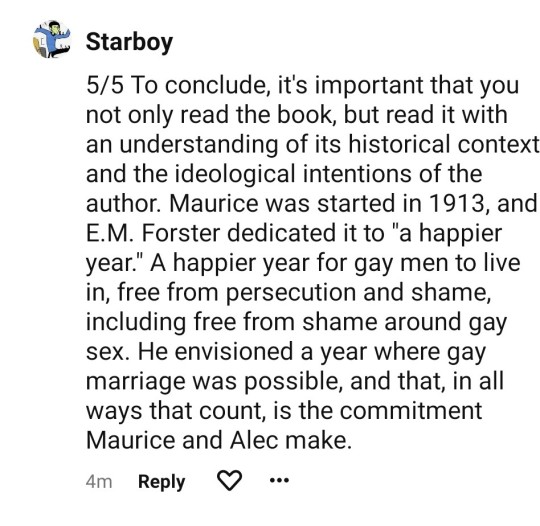
Anyway, I actually like what I wrote so I wanted to share it here. I didn't say everything I wanted to in the exact way that I wanted to due to the word restrictions, but I think it did the job.
156 notes
·
View notes
Text
yeah i'd love to bring e.m forster back from the dead to let him know that maurice was published and made into a film and gay people can get married in britain now and stuff, but on the other hand how would we break the news to him that a significant percentage of maurice fans prefer clive to alec from a combination of classism and being horny for hugh grant
249 notes
·
View notes
Text
193 notes
·
View notes
Text
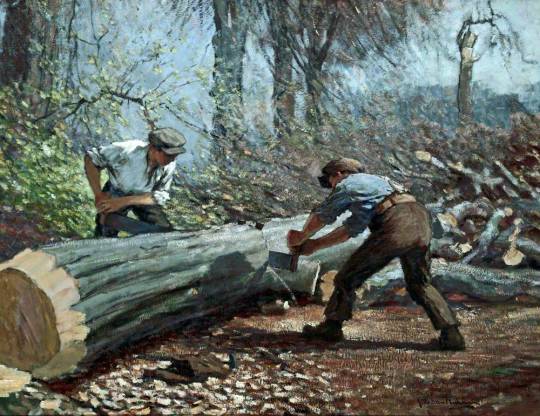
They must live outside class, without relations or money; they must work, and stick to each other till death. But England belonged to them. That, besides companionship, was their reward. Her air and sky were theirs...
The Woodcutters by James Hamilton Mackenzie (1875-1926), Williamson Art Gallery & Museum
artuk.org
131 notes
·
View notes
Text
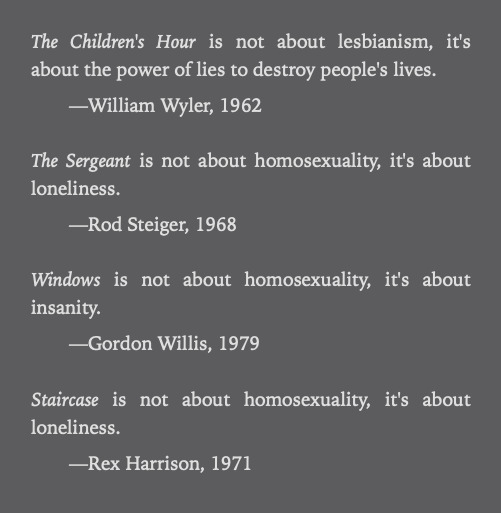

Vito Russo, The Celluloid Closet: Homosexuality in the Movies
603 notes
·
View notes
Text

It's my 1 year anniversary on Tumblr 🥳
2 notes
·
View notes
Text
Who and What Really Inspired E.M. Forster's Maurice?
(Inspiration and source for this post: "Edward Carpenter and the Double Structure of Maurice" by Robert K. Martin, Ph.D.)
WE KNOW that E.M. Forster was directly influenced by Edward Carpenter (and his life with a lower class man, George Merrill) to write the happy ending of Maurice. Forster himself was a disciple of Carpenter; specifically, he subscribed to Carpenter's belief in the "Uranian" love (love and loyalty between two men that can include a physical relationship). Forster said in the Terminal Notes of Maurice that Maurice and Alec are capable of such love and loyalty—as defined by Carpenter—between each other.
But it wasn't Carpenter who first "invented" that idea of love and loyalty; it was, in fact, Carpenter's influencer and mentor, American poet Walt Whitman.
Carpenter was a disciple of Whitman, and Forster was a disciple of Carpenter. Below, the texts from each's relevant works in chronological order will enlighten on the origin of the inspiration behind Maurice—i.e., what made the happy ending between Maurice and Alec possible, way before Forster even knew Carpenter.
—Walt Whitman in 1856: "Song of the Open Road" from Leaves of Grass
Camerado, I give you my hand!
I give you my love more precious than money,
I give you myself before preaching or law;
Will you give me yourself? will you come travel with me?
Shall we stick by each other as long as we live?
—Edward Carpenter in 1902: "Hafiz to the Cupbearer" from Towards Democracy
"Come, son (since thou hast said it), out of all Shiraz
Háfiz salutes thee comrade. Let us go
A spell of life along the road together."
(FYI: this poem was written by Carpenter to commemorate Merrill braving a blizzard to finally move in with him in 1898.)
—E.M. Forster in 1914 and 1932: Maurice (published in 1971)
“Did you ever dream you had a friend, Alec? Someone to last your whole life and you his." (First written in 1932.)
"They must live outside class, without relations or money; they must work and stick to each other till death. " (First written in 1914.)
"He could die for such a friend, he would allow such a friend to die for him; they would make any sacrifice for each other, and count the world nothing, neither death nor distance nor crossness could part them, because 'this is my friend.'" (First written in 1914.)
It's as if Whitman originated the idea of finding a friend who would last his whole life, and whose love is valued above class and society;
and he instilled it into Carpenter who later was able to live out that idea in real life with Merrill;
and Forster, having witnessed that idea lived out in real life through Carpenter and Merrill, wrote it into fiction so that it's lived out through Maurice and Alec—"for the ever and ever that fiction allows,” in the greenwood.
That's the very symbolic meaning of Maurice and Alec roaming the greenwood: Carpenter and Merril weren't immortal, so their love for each other obviously wouldn't last forever in that literal sense; Forster knew that, but he did what others couldn't: he immortalized their love and Whitman's idea of "Someone to last your whole life" through Maurice, so that for as long as Maurice and Alec roam the greenwood, the love between Carpenter and Merril would live on even if not in real life, and Whitman's idea would thus never die.
Whitman's philosophy is like an heirloom passed down from him to Carpenter to Forster. The connection is more in the clear if you put Forster's and Whitman's lines side by side:
"They must live outside class,
without relations or money;
they must work and stick to each other till death."
VS
"I give you my love more precious than money,
I give you myself before preaching or law;
...
Shall we stick by each other as long as we live"
143 notes
·
View notes
Text
Mr. Ducie asked a young Maurice to invite Maurice’s over to meet him when he grew up, so years later Maurice brought his “wife”, Alec, to Mr. Ducie.
Also in the first draft of the novel, Maurice specifically said to Alec that he wanted marriage with Alec.
I just had a realization. At the beginning of Maurice (1987), Mr. Ducie tells him that his wife and him will dine with Maurice and his wife, when Maurice says "I think I shan't marry". Then fast-forward to the scene where Maurice and Mr. Ducie meet up in the museum and Maurice is with Alec. Although Mr. Ducie doesn't recognize Maurice, he still manages to meet Maurice's future husband (not legally of course, but I think between them they were married).
79 notes
·
View notes
Text
Sweet Moments Between Maurice and Alec That You Have Not Seen Before (From E.M. Forster's 1st Draft for Maurice)
Context: Forster's first version of Maurice, finished in 1914, has a rather different ending than the final published version (no hotel scene, and no boathouse reunion). See here.
Forster's first draft for Maurice is, in my opinion, the rawest in terms of boldly displaying the love shared between Maurice and Alec. This version shows much more of Alec's emotion and tenderness, as well as of Maurice's sentiments and affection towards Alec. It is definitely not as subtle as the final version, with quite a few straightforward declarations of love.
Hence, I'm disappointed that Forster did not manage to integrate at least some of these 1914 texts into the final version: it would've made the love between Maurice and Alec much more pronounced and convincing, as well as made Alec a character with more depth and feelings.
Having read Forster's first draft for Maurice, I share below some of these moments between Maurice and Alec that are not in the final version (ordered on how lovely I think each moment is. Bolded texts are the highlights).
1. After running into Mr. Ducie in the museum and Maurice bursting out to Alec.
M: "I'd possibly have blown out my own brains."
A: "Why?" he asked, stopping dead.
M: "I should have known by that time that I loved you."
A: "You can't, sir, you couldn't."
M: "I love you, sir be damned."
A: "Maurice"—never before had the word been spoken—"you're an angel."
M: "I don't want to hear that."
A: "Maurice, Maurice" his voice failed also; he had once said the rest to a woman. "Maurice - what you've said I feel. Understand?"
M: "I think so, but I want to be sure. Remember those rose bushes in the other rain? - Look at me hard - That's right. That'll do. It's settled." (Maurice is referring to the moment when Alec ran in the rain across the rose bushes at Penge just to see Maurice's face.)
2. The conversation after Maurice refuses to stay the night with Alec—a scenario that only happens in the first draft in 1914. Be prepared for tears.
A: "Come just for a little to me."
M: "If I came it would be for ever."
A: "Ever's the best."
M: "Why, man, you sail Thursday."
Alec found no answer.
... (here's when Maurice explains in a long paragraph why they can't be together because of their class difference and the fact that they're both men)
M: I thought from that letter of yours you might want me to come. But, Alec, come where to?"
A: "I'd know if you weren't a gentleman," Alec said. "We'd a' found work together as mates."
M: "Yes, and if you were a gentleman, I'd take you this minute to my home.
A: "I'd a' been what young Clive was to you, then."
M: "He's a saint and we aren't. Leave out him."
A: "I'd a' been yours till death, then." ("I would've been yours till death, then")
M: "Out there if you get a chance to marry, take it. That's what I wish.
A: "Maurice, what'll you do without me, dear? Have you no other friends?"
Maurice dared not look forward to his own future. He rushed on the parting.
M: "And if there's ever a child, I shan't ever have that, so remember me."
A: "I'll remember you, child or none. God bless you. O God bless you, and be with you if I can't."
3. Right after Maurice puts his hand on Alec's back in the museum
"Yes, awfully serious," remarked Maurice, and rested his hand on Alec's shoulder, so that the fingers touched the back of the neck, doing this merely because he knew that he loved Alec, that he loved him not as a second Dickie Barry, but deeply, tenderly, for his own sake, beneath weakness and vulgarity.
4. In the museum, Alec in pain and acting cute
[Alec] had bitten his lip, his eyes were red too; face and body were cramped with pain.
M: "Alec -"
A: "Alec am I?"
M: "I'm sorry I used that other name of yours."
A: "Don't speak to me," he growled, "let me go, you calling me Alec when I"
M: "Did you give me away then on purpose?"
A: "You're correct.
M: "Was it to get money - or only to do me harm?"
A: "I couldn't say."
M: "Come, let's get away where we can finish our talk."
A: "What? What do you say?"
M: "Come along, Alec."
A: "Do you call me that still?"
M: "Come away, man, don't break down for God's sake...." He took hold of [Alec's] arm. The touch was not reminiscent; it hinted at a relation to come.
A: "Oh but you must, I want it." Alec yielded.
5. Maurice at night thinking about Alec's letter
He tried to forget the treacherous letter, but it stole back to his mind, and he suffered most during moments in bed, when it masqueraded as a real love letter, and offered him the completeness that Clive enjoyed with Anne.
(This is brilliant writing because we, as readers, know that Alec's letter is a love letter, yet Maurice's "muddles" prevent him from seeing it as a love letter, and it is only at night, when he's craving Alec's presence, that he's able to allow himself to see the truth and succumb to his feelings for Alec.)
6. One version of Maurice's and Alec's first night together
A: "Good evening - sir, said the low voice. Was you wanting something? Couldn't you sleep?" It was the gamekeeper.
On your rounds? gasped Maurice, trying to sound natural, and felt corduroys. Their touch disconcerted him. Whither was he tending from Clive into what companionship?
A: "Just wait till I've set down my gun - eh aren't you trembling?"
M: "So are you - ah don't."
A: "Don't you like that?"
M: "I don't know."
A: "Christ you're fussy. Don't you like me to touch you."
M: "That's you lad."
A: "Yes."
Side notes: hopefully these will shut all the detractors (of the relationship between Maurice and Alec) up—namely Clive apologists, Clive+Maurice shippers, and all of those dark academia classist out there.
409 notes
·
View notes
